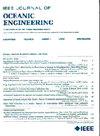基于OTFS水声通信系统干扰重构的直接自适应Turbo均衡
IF 5.3
2区 工程技术
Q1 ENGINEERING, CIVIL
引用次数: 0
摘要
正交时频空间(OTFS)调制作为一种很有前途的调制方案,近年来得到了人们的认可。在时变信道中,与正交频分复用相比,它在误差性能方面具有显著的优势。在本文中,我们将OTFS调制应用于移动水声通信。我们提出了一种带有二维决策反馈均衡器的自适应涡轮均衡技术来解决二维干扰问题。为了减轻相位翻转和圆卷积在延迟多普勒域引起的性能下降,我们进一步提出了一种基于干扰重建的二维DA-TEQ。提出了一种基于改进的比例归一化最小均方算法的自适应信道估计方法来重建干扰。为了验证提出的OTFS UWA通信方案,于2022年7月在中国河南丹江口湖进行了湖泊实验。实验结果表明,该方案在速度为4.5节,数据速率为5.79 kbps的情况下取得了令人满意的性能。实验验证了OTFS调制在UWA移动通信中的有效性。本文章由计算机程序翻译,如有差异,请以英文原文为准。
Direct-Adaptive Turbo Equalization Based on Interference Reconstruction for OTFS Underwater Acoustic Communication System
Orthogonal time frequency space (OTFS) modulation has recently gained recognition as a promising modulation scheme for high-mobility communication systems. It offers significant advantages in terms of error performance compared to orthogonal frequency division multiplexing in time-varying channels. In this article, we apply OTFS modulation to mobile underwater acoustic (UWA) communication. We propose an adaptive turbo equalization technique with a 2-D decision feedback equalizer to address the issue of 2-D interference. To mitigate the performance degradation caused by phase flipping and circular convolution in the delay-Doppler domain, we further propose a 2-D DA-TEQ based on interference reconstruction. An adaptive channel estimation based on the improved proportionate normalized least mean squares algorithm is proposed to reconstruct the interference. To validate the proposed OTFS UWA communication schemes, a lake experiment was conducted in Danjiangkou Lake, Henan, China, in July 2022. The experimental results demonstrate that the proposed scheme achieves satisfactory performance at a speed of 4.5 knots, with a data rate of 5.79 kbps. This experiment confirms the effectiveness of OTFS modulation for mobile UWA communication.
求助全文
通过发布文献求助,成功后即可免费获取论文全文。
去求助
来源期刊

IEEE Journal of Oceanic Engineering
工程技术-工程:大洋
CiteScore
9.60
自引率
12.20%
发文量
86
审稿时长
12 months
期刊介绍:
The IEEE Journal of Oceanic Engineering (ISSN 0364-9059) is the online-only quarterly publication of the IEEE Oceanic Engineering Society (IEEE OES). The scope of the Journal is the field of interest of the IEEE OES, which encompasses all aspects of science, engineering, and technology that address research, development, and operations pertaining to all bodies of water. This includes the creation of new capabilities and technologies from concept design through prototypes, testing, and operational systems to sense, explore, understand, develop, use, and responsibly manage natural resources.
 求助内容:
求助内容: 应助结果提醒方式:
应助结果提醒方式:


